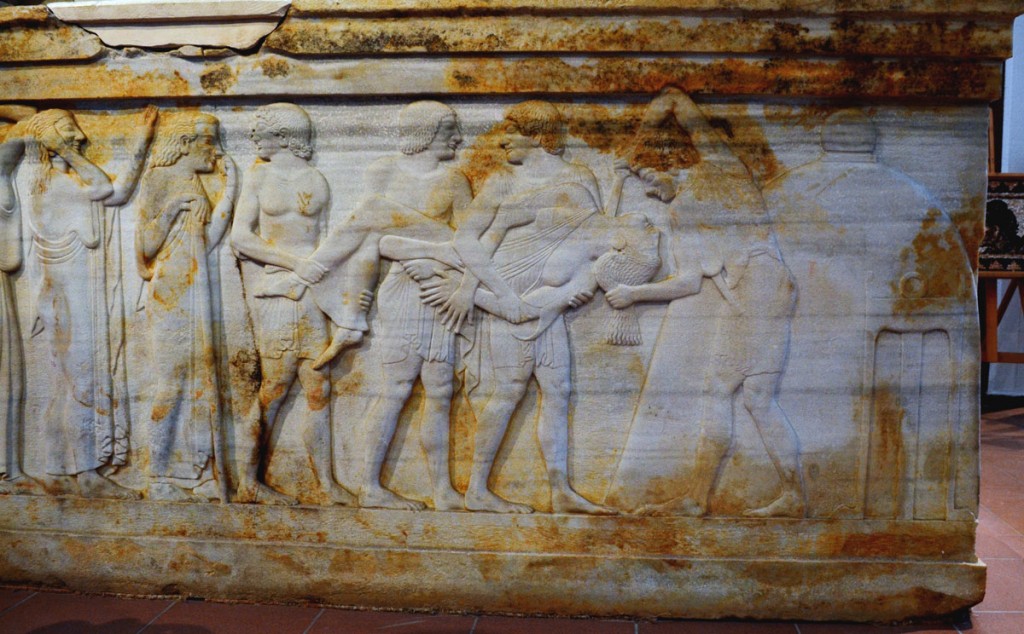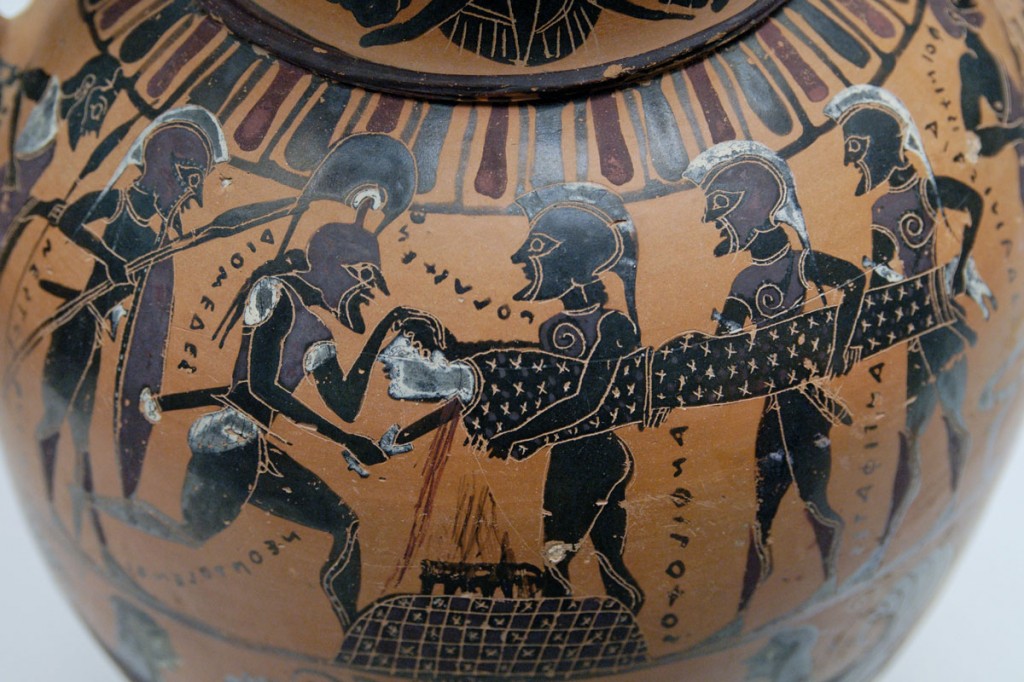Na; the sea’s like the land, but fearsomer. If there’s folk ashore, there’s folk in the sea – deid they may be, but they’re folk whatever’ and as for deils, there’s nane that’s like the sea deils… labsters an’ partans, an’ sic like, howking in the deid; muckle, gutsy, blawing whales’ an’ fish – the hale clan o’ them – cauld-wamed, blind-eed uncanny ferlies. O, sirs,” he cried, “the horror – the horror o’ the sea! R.L. Stevenson, The Merry Men
The sorrows of those who run after another god shall multiply; their drink offerings of blood I will not pour out or take their names on my lips. (Psa 16:1 ESV)
The Pentateuch knows several kinds of libations. There are libations of water, oil and wine – but never of blood. Psalm 16:1 is the only place where we find any mention of a blood libation and it is in a negative sense. The sacrificial laws of the Old Testament expressly forbid the sacrifice of animals ‘upon the ground’ so that their blood was allowed to run into the ground. The Israelites were to slaughter the sacrifice at the entrance of the tabernacle and the blood was to be sprinkled on the altar. Deuteronomy makes allowance for non sacrificial slaughter in the open field but in this case, the blood must be ‘poured out like water’ – that is, not ceremonially.
So what exactly was the purpose of a libation of blood and why would does the Psalmist single out this particular practice? I suspect the reason why is because the blood libation had to do with the cult of the dead. Leviticus 17:7 assumes that, until the giving of the sacrificial laws, the people sacrificed to ‘goat demons’ – what is is probably a general category for spirit beings who inhabit the ground. In Roman times, the blood of victims was poured into the ground to satisfy the restless spirits of the dead. Franz Cumont writes,
Fights of gladiators, whose blood drenched the soil, originally formed part of the funeral ceremonies. It is said that these sacrifices were intended to provide him who had gone to the other world with servants and companions, as the offering of a horse gave him a steed, or else that, in case of violent death, they were meant to appease the shade of a victim who claimed vengeance. (Cumont 1959, 51)
Cumont further observes that sacrifice to the dead “was at first often a human sacrifice of slaves or prisoners – Octavius, upon taking Perugia on the Ides of March, caused three hundred notables of the town to be slaughtered on Caesar’s altar…” (Suetonius, Life of Augustus – 15) We find this same idea in Greece. For example, Euripides tells a story about the sacrifice of the virgin Polyxena to the spirit of Achilles. This sacrifice was made at the tomb of Achilles in order to get a favorable wind home after the sacking of Troy:
The Argives with one consent are eager for thy sacrifice to the son of Peleus at his tomb.
The language used to describe the slaying of Polyxena is the same kind of language used to describe the slaying of an animal. Thus Polyxena laments,
As a calf of the hills is torn from its mother, and sent beneath the darkness of the earth with severed throat for Hades, where with the dead shall I be laid, ah me!
When the son of Achilles slays the girl, he prays:
Son of Peleus, father mine, accept the offering I pour thee to appease thy spirit, strong to raise the dead; and come to drink the black blood of a virgin pure, which I and the host are offering thee; oh!
This sacrifice is famously depicted on a sarcophagus found in Turkey that dates to ca 525 BC. That means the depiction on the sarcophagus is older than the story told by Euripides. Euripides would have us believe that Polyxena wished to die instead of live a life of slavery, but the relief on the sarcophagus tells a different story. The tall mound in the background is the grave of Achilles – emphasizing the fact that this is a sacrifice for the dead.


Sorry about the graphic and not very pleasant reading. I think it at least brings home the idea behind blood libations and the reality of human sacrifice that is so often denied in modern scholarship. I don’t think the Psalmist necessarily had in mind human sacrifice in Psalm 16 but the principle is the same in either case. The spirits of the dead needed the blood of the sacrifice just as the gods in heaven needed its meat. Franz Cumont writes,
“When blood was sprinkled on the soil which covered the remains of a relative or a friend, a new vitality was given to his shade.” (Cumont 1959, 51)
This makes the conclusion of Psalm 16 all the more meaningful. The Psalmist does not look forward to a future as a disembodied spirit inhabiting a tomb and waiting for a friend or relative to bring a food offering or a blood libation. His hope is of a completely different order,
I have set the LORD always before me; because he is at my right hand, I shall not be shaken.
Therefore my heart is glad, and my whole being rejoices; my flesh also dwells secure.
For you will not abandon my soul to Sheol, or let your holy one see corruption (shachat).
You make known to me the path of life; in your presence there is fullness of joy; at your right hand are pleasures forevermore. (Psa 16:8-11 ESV)
The word translated ‘corruption’ is shachat which some of the more modern versions translate as ‘pit’ (NET, JPS, TNK) The word could be translated either way – and it is possible that the Psalmist intended for the word to stand for both meanings. Unfortunately, translators have to choose one or the other. It is worth nothing that the LXX translates shachat as ‘corruption’ and for good reason. If we translate the phrase ‘to see the Pit’ then we must ask what exactly did the Psalmist mean by this? The Psalmist’s hope is not that he will be kept from the grave, but that he will not be abandoned there. To be abandoned in the grave is to experience corruption.
Did the psalmist switch from the 1st person to the 3rd person and assume the title ‘holy one’? Did the Psalmist really believe that he would not see the pit or experience corruption? The Apostle Paul and the Apostle Peter quote this passage in reference to Christ (Acts 2:27 13:25). The psalmist looks with a prophetic eye beyond his own circumstance to the resurrection of Christ – the firstfruits of those who are asleep, but not abandoned!
Bibliography
Cumont, F. V. M. (1959). After life in Roman paganism. New York,, Dover Publications.
Particularly appropriate this weekend, when the Passover/Easter message is in our minds. We have hope, true hope even as the psalmist wrote…and the older I get the more important that becomes.